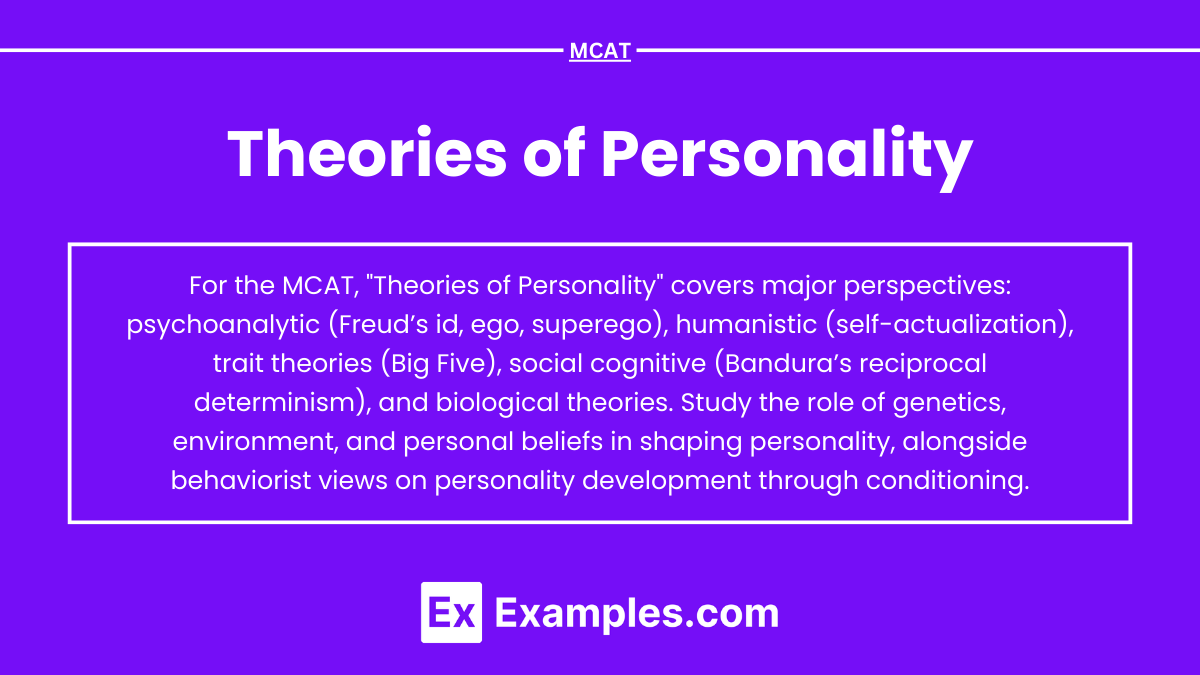Theories of personality explore the complex interplay of biological, psychological, and social factors that shape individual behavior and identity. In the context of the MCAT, understanding these theories is crucial for analyzing how personality traits influence human interactions, motivation, and mental health. Key theories include psychodynamic, trait, humanistic, cognitive-behavioral, and social-cognitive perspectives, each offering unique insights into personality development and expression. Grasping these concepts can enhance critical thinking and comprehension of psychological principles relevant to various medical and social contexts.
Learning Objectives
In studying "Theories of Personality" for the MCAT, you should learn to understand major personality theories, including psychodynamic, trait, humanistic, behavioral, and social-cognitive approaches. Analyze how these theories explain individual differences in behavior, motivation, and emotional regulation. Evaluate concepts like Freud’s psychoanalytic theory, the Big Five personality traits, Maslow’s hierarchy of needs, and Bandura’s social learning theory. Additionally, explore the impact of personality on mental health, interpersonal relationships, and behavior. Apply your understanding to interpret experimental results and psychological scenarios in MCAT practice passages, focusing on how different theories contribute to personality development and psychological well-being.
1. Psychoanalytic Theory
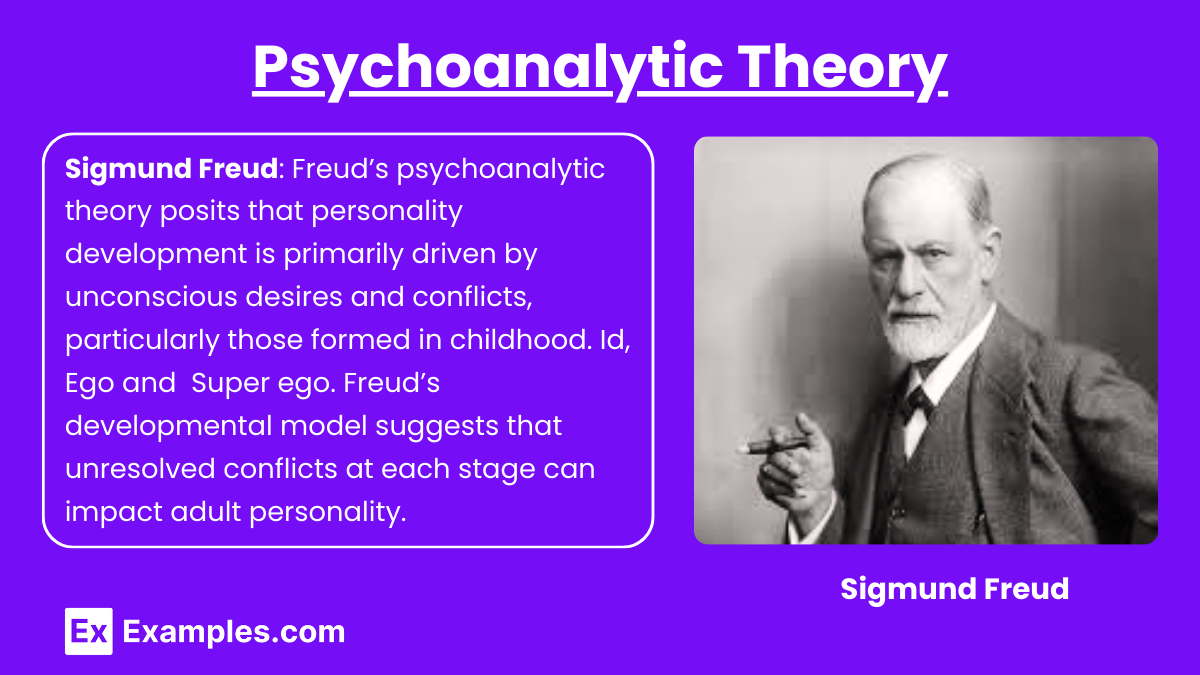
Sigmund Freud: Freud’s psychoanalytic theory posits that personality development is primarily driven by unconscious desires and conflicts, particularly those formed in childhood. Freud identifies three components of personality:
Id: The primal, unconscious part of personality driven by pleasure-seeking instincts.
Ego: The rational, conscious self that mediates between the id and reality.
Superego: The moral compass, guiding behavior to conform to societal norms.
Psychosexual Stages: Freud’s developmental model suggests that unresolved conflicts at each stage (oral, anal, phallic, latency, and genital) can impact adult personality.
Defense Mechanisms: Strategies like repression, denial, and projection help individuals cope with anxiety and internal conflict.
2. Humanistic Theories
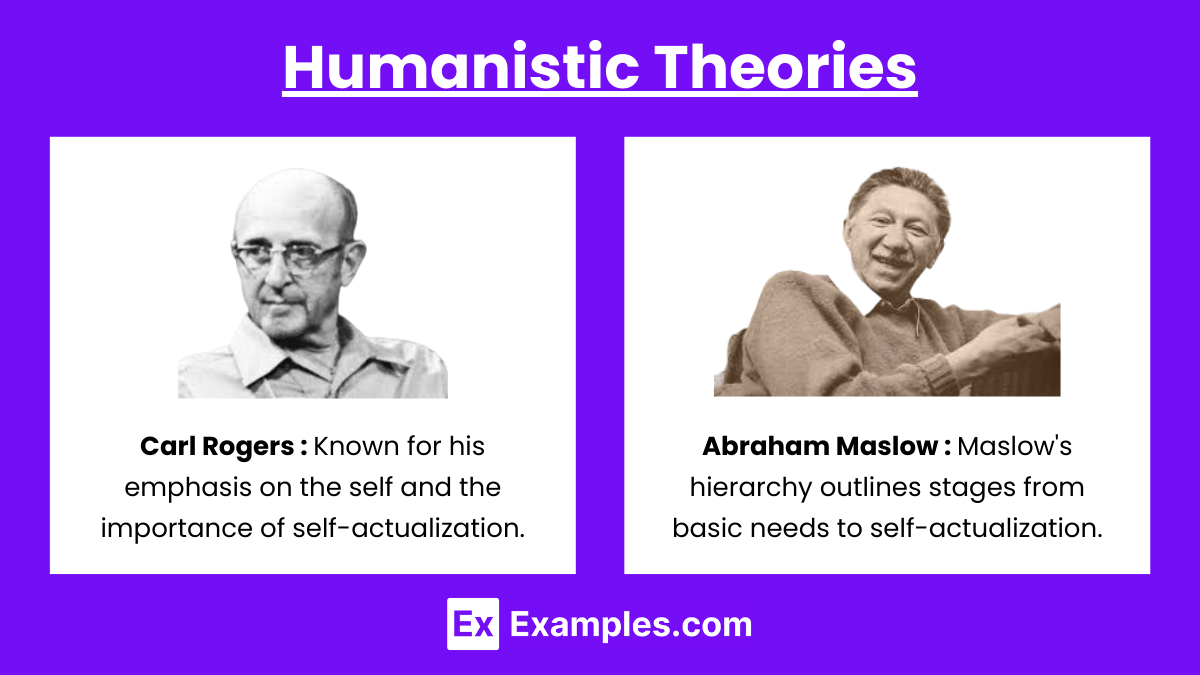
Carl Rogers: Known for his emphasis on the self and the importance of self-actualization (reaching one's full potential). Rogers introduced the concept of the "ideal self" versus the "real self" and posited that congruence between these two leads to a healthier personality.
Abraham Maslow: Created the hierarchy of needs model, which suggests individuals move through stages from basic needs (like food and shelter) to self-actualization. Only when lower needs are satisfied can a person pursue higher levels of psychological growth.
3. Trait Theories
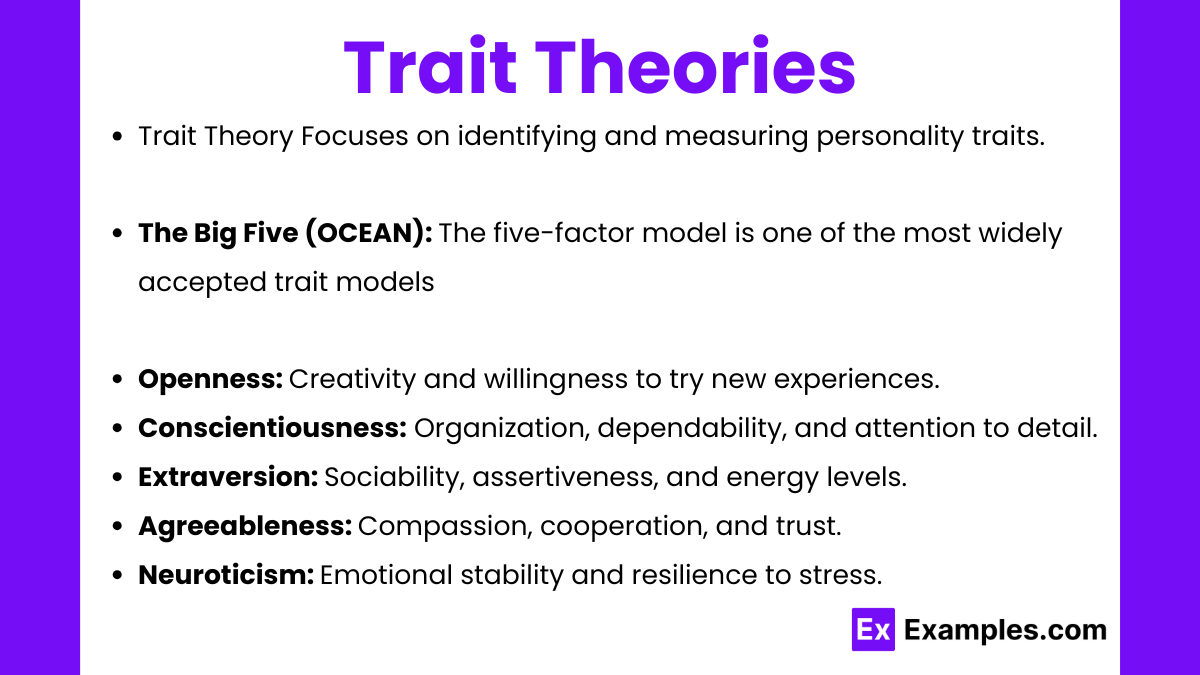
Trait Theory: Focuses on identifying and measuring personality traits. Traits are relatively stable, consistent characteristics that influence behavior across different situations.
The Big Five (OCEAN): The five-factor model is one of the most widely accepted trait models:
Openness: Creativity and willingness to try new experiences.
Conscientiousness: Organization, dependability, and attention to detail.
Extraversion: Sociability, assertiveness, and energy levels.
Agreeableness: Compassion, cooperation, and trust.
Neuroticism: Emotional stability and resilience to stress.
4. Social Cognitive Theory
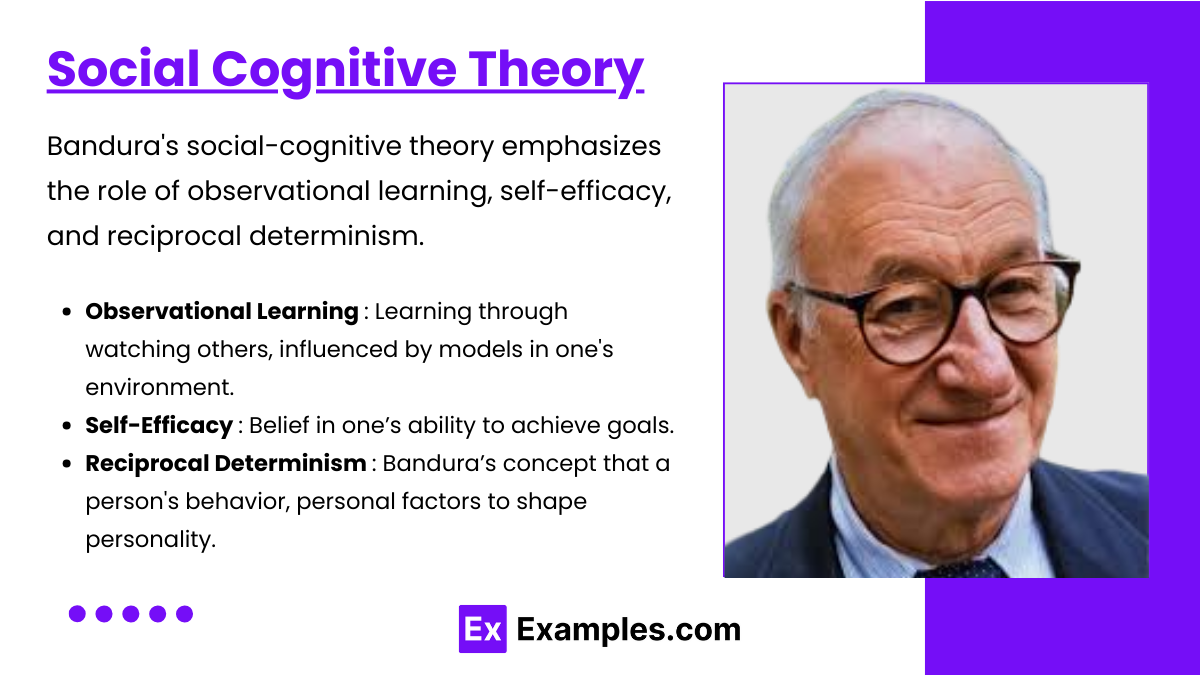
Albert Bandura: Bandura's social-cognitive theory emphasizes the role of observational learning, self-efficacy, and reciprocal determinism.
Observational Learning: Learning through watching others, influenced by models in one's environment.
Self-Efficacy: Belief in one’s ability to achieve goals.
Reciprocal Determinism: Bandura’s concept that a person's behavior, personal factors, and environment interact to shape personality.
5. Behaviorist Theory
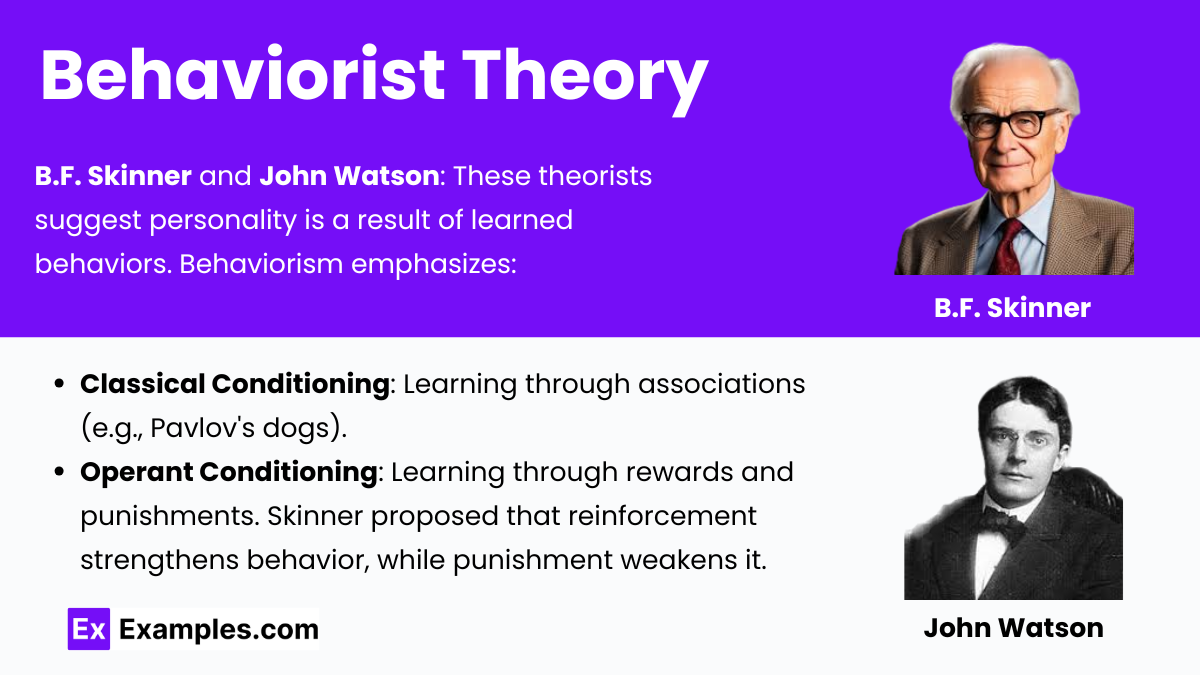
B.F. Skinner and John Watson: These theorists suggest personality is a result of learned behaviors. Behaviorism emphasizes:
Classical Conditioning: Learning through associations (e.g., Pavlov's dogs).
Operant Conditioning: Learning through rewards and punishments. Skinner proposed that reinforcement strengthens behavior, while punishment weakens it.
6. Biological Perspectives
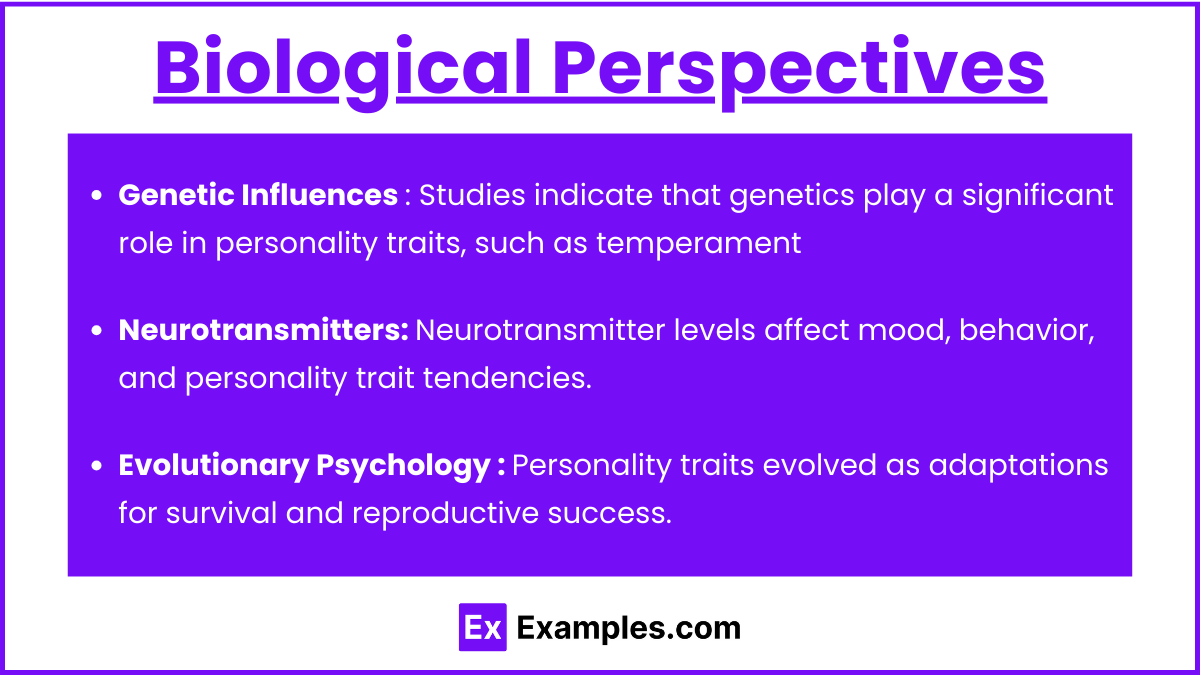
Genetic Influences: Studies indicate that genetics play a significant role in personality traits, such as temperament, which can be observed even in infancy.
Neurotransmitters: Levels of neurotransmitters like dopamine and serotonin can influence mood, behavior, and predisposition to certain personality traits.
Evolutionary Psychology: Proposes that personality traits may be adaptations, shaped by evolutionary pressures for survival and reproduction.
Examples
Example 1: Psychoanalytic Theory (Sigmund Freud)
Freud's psychoanalytic theory emphasizes the influence of the unconscious mind on behavior. He proposed that personality consists of three parts—the id (instinctual desires), ego (rational thought), and superego (moral standards). Freud suggested that childhood experiences, especially related to psychosexual stages, shape personality. Defense mechanisms also play a role in managing conflicts between these elements.
Example 2 : Humanistic Theory (Carl Rogers and Abraham Maslow)
Humanistic theories, like those of Rogers and Maslow, focus on personal growth and self-actualization. Rogers emphasized the importance of self-concept and unconditional positive regard, proposing that people are inherently good and motivated by a desire to fulfill their potential. Maslow introduced the hierarchy of needs, where self-actualization is the highest level that one can achieve, reached only after basic and psychological needs are met.
Example 3 : Trait Theory (Gordon Allport, Raymond Cattell, and Hans Eysenck)
Trait theory describes personality as a set of stable characteristics that influence behavior. Allport highlighted cardinal, central, and secondary traits. Later, Cattell proposed a 16-factor model of personality, while Eysenck simplified this to three main traits—extraversion, neuroticism, and psychoticism. The Big Five (OCEAN) model, building on these foundations, is widely accepted, describing five primary personality traits: openness, conscientiousness, extraversion, agreeableness, and neuroticism.
Example 4 : Social Cognitive Theory (Albert Bandura)
Bandura's social cognitive theory emphasizes the interaction between behavior, cognition, and environment (reciprocal determinism). He argued that people learn through observation and imitation (modeling). Self-efficacy, or belief in one's ability to succeed, is central to this theory. Bandura's "Bobo doll experiment" demonstrated that observing aggressive behavior can lead to similar behavior, highlighting the role of environmental influences in personality.
Example 5 : Behaviorist Theory (B.F. Skinner and John B. Watson)
Behaviorist theories focus on observable behaviors, suggesting that personality is shaped by external stimuli and reinforcement, rather than internal traits or unconscious desires. Skinner introduced operant conditioning, explaining that behaviors followed by rewards are likely to be repeated, while those followed by punishments are discouraged. Watson's classical conditioning similarly showed that personality traits could be learned through associations, emphasizing the role of the environment over innate traits.
Practice Questions
Question 1
Which of the following theories posits that personality is primarily shaped by unconscious motives and conflicts?
A) Humanistic Theory
B) Trait Theory
C) Psychodynamic Theory
D) Behavioral Theory
Correct Answer: C) Psychodynamic Theory
Explanation: The Psychodynamic Theory, primarily developed by Sigmund Freud, asserts that unconscious motives and conflicts play a crucial role in shaping an individual's personality. Freud believed that early childhood experiences significantly impact adult behavior and personality development. In contrast, Humanistic Theory focuses on personal growth and self-actualization, Trait Theory categorizes personality based on specific traits, and Behavioral Theory emphasizes the role of environmental factors and learned behaviors.
Question 2
Which personality theory emphasizes the role of self-actualization and personal growth?
A) Psychodynamic Theory
B) Humanistic Theory
C) Trait Theory
D) Cognitive Theory
Correct Answer: B) Humanistic Theory
Explanation: Humanistic Theory, notably advanced by psychologists such as Carl Rogers and Abraham Maslow, emphasizes the inherent goodness of people and their natural drive towards self-actualization and personal growth. It posits that individuals have the ability to shape their own lives and that personality develops through experiences and choices. In contrast, Psychodynamic Theory focuses on unconscious drives, Trait Theory identifies specific characteristics, and Cognitive Theory explores how thought processes influence behavior.
Question 3
According to Trait Theory, which of the following is considered a stable characteristic that influences behavior?
A) Motivation
B) Attitude
C) Trait
D) Experience
Correct Answer: C) Trait
Explanation: Trait Theory categorizes personality based on enduring characteristics known as traits, which are consistent over time and across various situations. Traits influence an individual's behavior, thoughts, and emotions. For instance, someone identified as "outgoing" is likely to exhibit sociable behaviors consistently. Motivation and attitude can change based on circumstances, while experience refers to the events that shape an individual's life but are not considered stable characteristics like traits.

